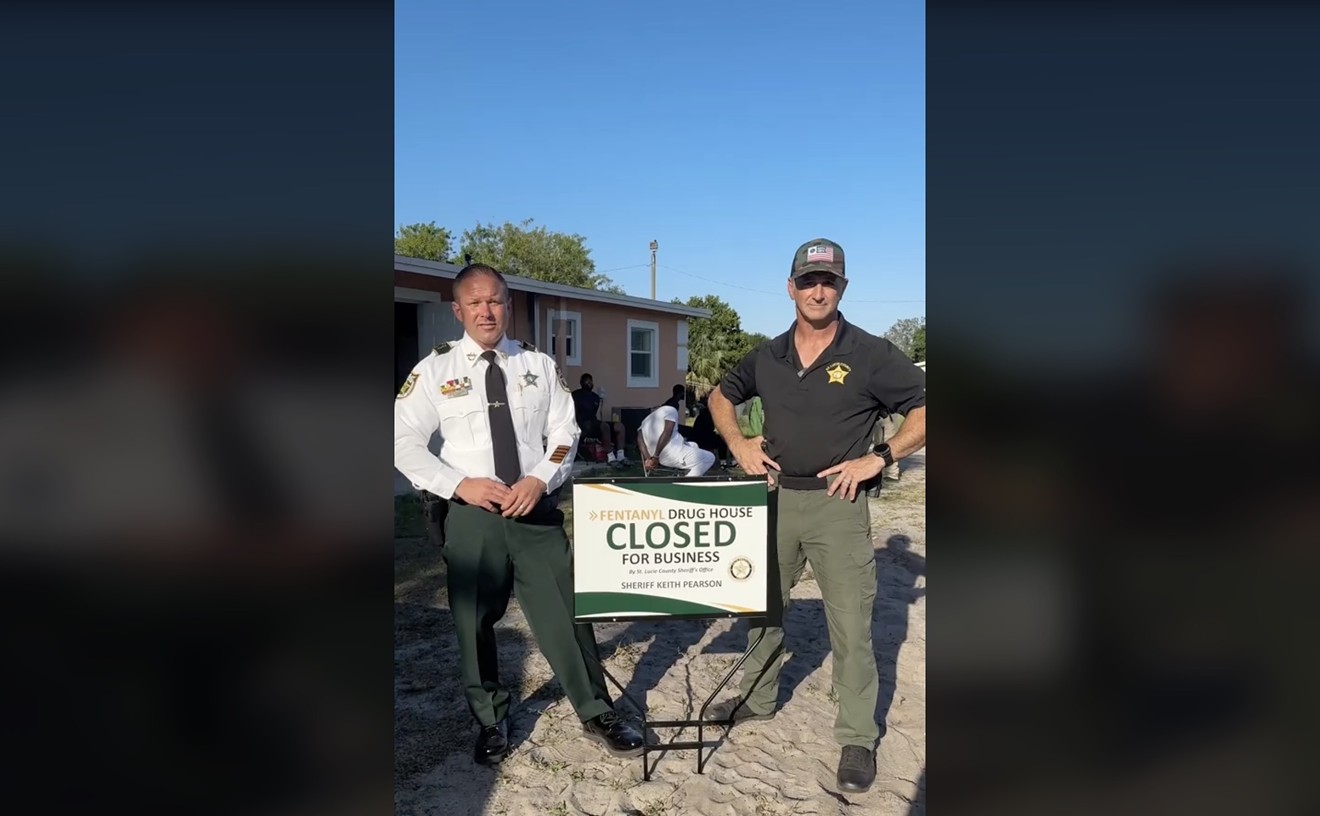Country Walk parents will tell you Frank Fuster is getting what he deserves. Vilified in the press for months before and during his trial, Fuster the molester was subsequently memorialized in Jan Hollingsworth's 1986 book, Unspeakable Acts, and a 1990 TV docudrama of the same name whose re-airing apparently triggered the most recent jailhouse attack.
Among social workers and prosecutors Country Walk has become legendary as the case that offers definitive proof that "ritual" child abuse is not a figment of overactive imaginations. The case made heroes of then State Attorney Janet Reno, and the two self-proclaimed child experts she recruited to interview alleged victims, Joseph and Laurie Braga. Just last week the Arts & Entertainment Network aired an hourlong special about the case, which spotlighted the Bragas' role in helping put Fuster away.
What the documentary didn't mention -- what virtually no one ever mentions -- is that, over the past eight years, Frank Fuster has compiled a small mountain of evidence to support his steadfast claims of innocence. Two weeks ago he filed a motion seeking a new trial, based in part on the Bragas' own questionable interviewing techniques. Compiled by attorneys Arthur Cohen and Robert Rosenthal, the 40-page brief sets out four distinct claims:
1)The gonorrhea test performed on Fuster's six-year-old son made use of a method that has been labeled "highly unreliable" by the Centers for Disease Control. When CDC lab workers used a superior method to re-evaluate thousands of samples that had originally tested positive, more than one-third of the samples proved to be negative. The child's gonorrhea test was the only physical evidence the state produced against Fuster and his wife Ileana. Despite hundreds of accusations lodged by children, many involving anal and vaginal penetration, doctors at Jackson Memorial Hospital's Rape Treatment Center found no other evidence of sexual abuse. Frank Fuster's own pretrial gonorrhea test was negative.
2)Defense attorney Jeffrey Samek failed to present compelling exculpatory evidence. Stephen Dinerstein, a private detective hired by Samek, now says he spoke with several witnesses who would have testified that Fuster was working outside his home at the time he was allegedly abusing children who came to his wife's at-home day-care service. But Dinerstein contends that Michael Von Zamft, Ileana Fuster's attorney, and Samek ignored these possible alibis. He claims they also overlooked another key witness, Maritza Betancourt, an adult cousin of Ileana's who lived with the Fusters for several months before their arrests in August 1984. Ileana's family members say Betancourt would have testified that she saw no abuse. "Every time I found something good, I was told to back-burner it," concludes Dinerstein, who filed a sworn statement in support of Fuster's motion. Samek has since passed away.
3)Ileana Fuster was psychologically coerced into giving her confession. For almost a year after her incarceration, the seventeen-year-old undocumented worker from Honduras insisted she and her husband were innocent of all charges. Only after Reno's office applied intense psychological pressure did the girl issue a vague, and at times contradictory, confession. As a result of testifying for the prosecution, Ileana Fuster was sentenced to ten years in prison, served three and a half, and was deported to Honduras in 1989. (This past March New Times published a cover story detailing Reno's own highly questionable role -- including at least three jailhouse visits with the defendant -- in eliciting Ileana Fuster's statements.)
Dinerstein met weekly with Ileana Fuster during much of her incarceration and witnessed her gradual psychic breakdown. "They kept her in isolation, sometimes naked. She was denied food. She had no idea what was going on, because her lawyers wouldn't talk to her," the investigator says. "One of the things that really got to her was when she had her period. The way she described it to me, they washed her down with a hose, like she was an animal."
By July 1985 Ileana Fuster began to tell Dinerstein, and others, that she was being browbeaten to testify against her husband. "She would say, 'They want me to say something that is not true,'" prison chaplain Shirley Blando recalled in a 1985 deposition. "She thought that about the [State Attorney] and the lawyers for both [herself and Frank Fuster]. She thought everybody wanted her to say, 'I saw my husband do these things.'"
As the trial neared, Reno enlisted the aid of Michael Rappaport, a psychologist who ran a business called Behavior Changers. By his own account, Rappaport visited Ileana at least 34 times in prison and spent hours lobbying her to confess. In a 1991 interview the psychologist compared his methods to "manipulation" and "reverse brainwashing...almost like a hypnotic thing." Subsequent studies by cognitive and memory specialists have concluded that such an approach can induce false memories and false confessions.
"When I read the statements Ileana gave I said, 'That's not Ileana,'" maintains Dinerstein, who was forbidden to visit the girl after Rappaport's sessions began. "She was such a detailed person. And those statements are so confused. It's obvious she was just saying things to save herself." Ileana Fuster's relatives say Dinerstein is right -- that Ileana has since told them she gave her testimony only to avoid further punishment.
4)The child interviews conducted by the Bragas should be ruled inadmissable. The majority of Fuster's motion is, in fact, a detailed analysis of the Braga interviews compiled by Robert Rosenthal, the same New York lawyer who helped overturn A on similar grounds A the conviction of Margaret Kelly Michaels, who was convicted in 1988 on 115 counts of child sex abuse at a New Jersey day-care center.
Rosenthal insists the Bragas' videotaped sessions "encompassed all the tactics which have been found to corrupt children's memories and recall abilities." He cites a spate of recent academic studies that condemn the use of leading questions, anatomical dolls, reward bribes, and other methods routinely employed by the Bragas. (Joseph and Laurie Braga did not return phone calls from New Times requesting comment.)
While the motion includes numerous excerpts of the Bragas in action, it does not cite the single most extreme instance, in which Joseph Braga explains to Fuster's six-year-old son that he must have been abused by his father, because he has gonorrhea. When the child denies having any memory of abuse, Joseph Braga tells him he is lying. Last November that same child, now sixteen, gave a deposition in which he again denied that his father had abused him, or any other children.
Trial judge Robert Newman, who will review the motion, has several options. He can summarily deny the motion. He can ask the Dade State Attorney's Office to respond with its own brief. And should he deem it necessary, he can order an evidentiary hearing to review Fuster's claims. If Newman finds the evidence convincing, he could vacate Fuster's previous judgment and sentence, and order a new trial.
Should Newman deny the motion, Rosenthal and Cohen insist they will keep appealing to a higher court, until they are allowed to present their new evidence before a judge. "My client got railroaded on these charges," says Cohen, a former public defender now practicing in Fort Lauderdale. "If this case had been tried today, he would have been acquitted. But eight years ago it just turned into a feeding frenzy. Frank was convicted before he ever walked into the courtroom."
Fuster himself, who won't be eligible for parole during his lifetime, remains hopeful this latest motion will allow him another chance to prove his innocence. He says he is in good health, except for the steel pen tip lodged in his neck, which doctors have given up trying to remove.










